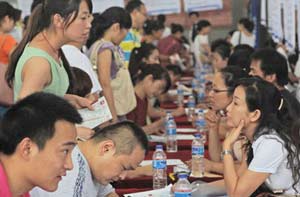China aims to ensure 'equal pay for same job'
[2012-12-25 10:39]China aims to ensure workers hired through labor contracting agents get the same treatment as directly hired employees.
Labor law review to ensure 'equal pay'
[2012-12-25 03:36]Review of the draft amendment to the Labor Contract Law started, aiming to ensure outsourced employees receive the same wages as regular workers.
China fulfills annual employment targets early
[2012-12-19 11:02]In the first 11 months of this year, 12.02 million new jobs were created in China, surpassing the goal of 9 million new jobs.
Economy may suffer as rich look overseas
[2012-12-18 02:00]The growing number of Chinese opting for investment immigration could damage employment and rural economies in their homeland, a new report warns.
 More new emigrants find success
More new emigrants find success
China to advance urbanization next year
[2012-12-17 09:01]China will actively and steadily push forward urbanization next year, with a focus on improving quality of the efforts.
Eyeing up jobs with Chinese companies
[2012-12-03 09:05]More expats are employed by or showed a stronger interest in working for China-based companies against a backdrop of the rise of the economy.
Samsung under fire over China labor breaches
[2012-11-27 15:28]Samsung came under renewed criticism from a rights group on Tuesday for illegal work practices at its Chinese suppliers.
Setting maximum work hours first
[2012-11-20 13:16]The nature of work and the availability of workforce vary from industry to industry. If our aim is to protect workers from overwork, setting legal maximum working hours would suffice.
Over half of young Chinese not fan of promotions
[2012-11-14 10:37]More than half of young Chinese workers care more about positions that give play to their talents than the prospect of promotions.
Most Chinese prefer foreign firms: survey
[2012-11-06 08:34]The majority of Chinese employees prefer to work for foreign companies, but employment at State-owned firms is growing in popularity, a survey has found.
Have work, need help
[2012-11-03 14:42]The uncoordinated creation of job opportunities with the supply of workers has already presented a tough challenge for the development of SMEs in China.
Employers rethink hiring practices
[2012-10-18 13:07]About half of Chinese employers surveyed say the current tough economic environment has changed the skills needed to make their people high performers.
China's employment situation 'generally stable'
[2012-09-10 13:08]Employment in China has been kept "generally stable" despite a slowdown in economic growth, a human resources official said Monday.
More Chinese grads turn to Japanese IT firms
[2012-09-06 13:27]More and more young graduates from Chinese universities have joined their counterparts from neighboring Asian countries in seeking employment in Japanese firms.
Motorola employees demand better compensation
[2012-08-30 02:29]Motorola Mobility employees in Nanjing, Jiangsu province, said on Wednesday that they will not sign employment termination agreements until the company approves revised compensation packages.
Employment market sees continuous depression
[2012-08-27 10:24]The employment market in China continues to be in a depression according to the HSBC China Manufacturing Purchasing Managers' Index. The PMI is a preliminary gauge of manufacturing industry and hiring. The PMI survey's employment sub-index was 47.7 in August, almost the same as July, showing that firms are laying off workers for the sixth consecutive month.
Jobseekers eye foreign-funded firms: report
[2012-08-23 09:58]Overseas-funded enterprises enjoyed greater recognition by Chinese jobseekers in 2012, according to a report released Wednesday.
Employment rate up for vocational school grads
[2012-07-25 13:42]Out of China's 6.63 million vocational school graduates, 96.71 percent found jobs last year, a slight increase from 96.56 percent in 2010.
China's urban unemployment rate reaches 4.1%
[2012-07-25 10:55]China's urban registered unemployment rate stood at 4.1 percent at the end of June, the Ministry of Human Resources and Social Security said Wednesday.
Wen warns of 'complicated, grim' job situation
[2012-07-23 09:29]China will face new employment pressure as the situation becomes more complicated and more severe in creating sufficient jobs amid economic slowdown.


